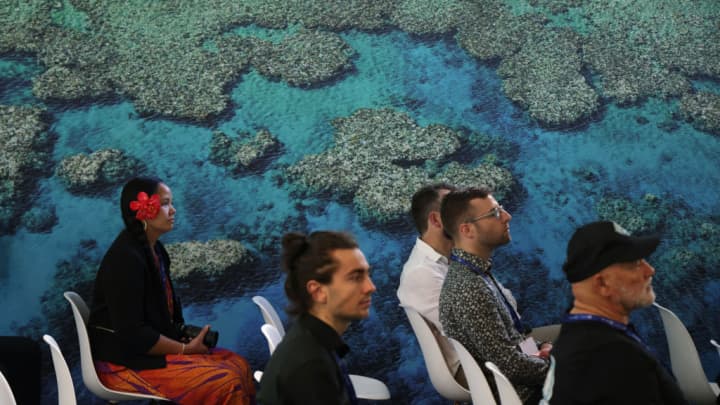
DUBAI, United Arab Emirates — Representatives of Pacific Island states expressed frustration and disappointment at the final outcome of the COP28 climate summit in the United Arab Emirates, saying they were left out of the plenary room when the concluding deal was decided.
"We weren't in the room when this decision was gavelled. And that is shocking to us," Tina Stege, the climate envoy for the Marshall Islands, said Wednesday while speaking outside of the plenary.
Anne Rasmussen, the lead negotiator for the Alliance of Small Island States (AOSIS), told the COP28 Presidency in a closing statement: "We are a little confused about what just happened."
"It seems that you gavelled the decisions, and the small island developing states were not in the room. We were working hard to coordinate the 39 small island developing states that are disproportionally affected by climate change, and so were delayed in coming here," she said.
"So, we will deliver the statement that we were going to deliver before this text was adopted without us."
After days of intense negotiations that included a full-day extension beyond the summit's official end date, government ministers representing nearly 200 countries to a deal that calls for a transition away from fossil fuels. A previous draft proposal was met with .
The COP28 UAE Presidency praised the agreement as a "paradigm shift that has the potential to redefine our economies," making a first-ever reference to the need for transitioning away from all fossil fuels.
For Pacific Island nations, however, and many other island and low-lying coastal states vulnerable to rising sea levels, the deal falls severely short.
"We see a litany of loopholes," the AOSIS statement reacting to the deal said. "It does not deliver on a subsidy phaseout, and it does not advance us beyond the status quo."
"We do not see any commitment or even an invitation for Parties to peak emissions by 2025," it said. "It is not enough for us to reference the science and then make agreements that ignore what the science is telling us we need to do. This is not an approach that we should be asked to defend."
For the Pacific Islands, climate change poses an existential threat.
During the COP27 summit in 2022, leaders of the group of islands urgently pointed to climate change as "the single greatest existential threat facing the Blue Pacific" and emphasized the immediate need to limiting the global average temperature rise to 1.5 degrees Celsius "through rapid, deep and sustained" reductions in greenhouse gas emissions.
The 1.5 degrees Celsius threshold is the aspirational global temperature limit set in the . Its importance is widely recognized because so-called become more likely beyond this level.
At this year's summit, Big Oil sought to shift the focus to reducing emissions through improved technology rather than the phasing out fossil fuels — the burning of coal, oil and gas — .
Many countries and activists had pushed for the COP28 outcome "we are truly at the beginning of the end of the fossil fuel era," and a draft text Tuesday that omitted the demand for phasing out the fuels sparked anger.
"Where it stands, the science tells us that 1.5 degrees is our survival line. And in order for us to make it to 1.5, we need a phase out of fossil fuels," Brianna Fruean, a Samoan climate activist with the Pacific Climate Warriors, told CNBC.
"We weren't able to see those words 'phase out,' we weren't able to see the timeline or even mechanism in which countries are responsible to phase out. The fossil fuel industry still expands to this day, they're making billions. And that's not enough for us."
"A good indication of how we've been listened to in this process is that the final deal was gavelled while some of the small island states were still trying to get in the room, because we received the text so late, and we were trying to coordinate and see where all of these islands stand on the text," Fruean added. "So from their coordination room into the plenary, some of them weren't even able to make it, they were walking in as there was a standing ovation."
For Shiva Gounden, the head of Pacific at Greenpeace Australia Pacific, the COP28 agreement — known as the global stock take (GST) — felt like a betrayal.
"As a Pacific Islander on the frontline of the climate crisis, I'm gutted by the outcome of COP28 and was shocked to see the GST text adopted so quickly. The final outcome falls short of what's needed in terms of fossil fuel phase out and finance," she told CNBC.
Gounden called the document's transition language "feeble," saying it fails to align with the 1.5 degrees Celsius goal and is full of loopholes that "leave the door open for false solutions like carbon capture and storage and nuclear."
Those technologies have been promoted by many major companies and advocacy groups, as well as oil and gas producers, as solutions for reducing emissions. Their safety and efficacy remains a matter of heated debate in the energy and climate world.
"This decision is a betrayal of the vulnerable communities who have relentlessly advocated for a swift and fair fossil fuel phaseout," Gounden said. "The urgency of our plight has been met with hollow gestures. Corporate interests have hijacked the COP28 agenda."
The COP28 Presidency did not immediately respond to a CNBC request for comment.
In a social media post immediately following the final deal's announcement, the UAE summit presidency praised it as a "global goal to triple renewables and double energy efficiency" and said that "more oil and gas companies stepping up for the first time on methane and emissions. And we have language on fossil fuels in our final agreement."




